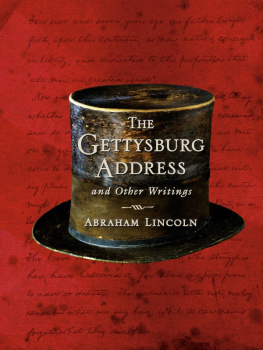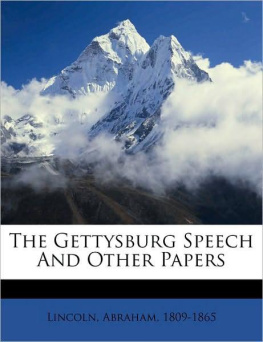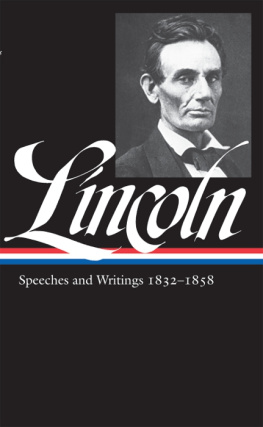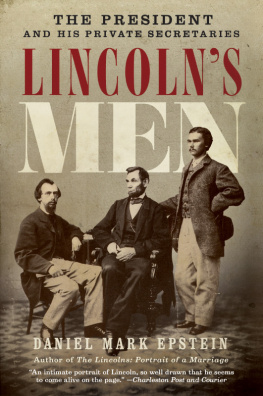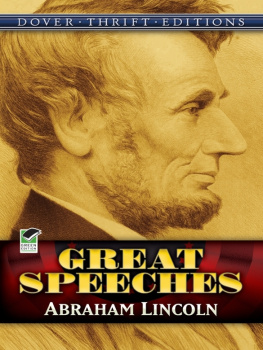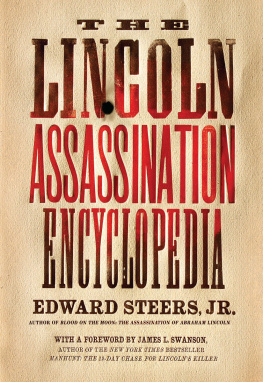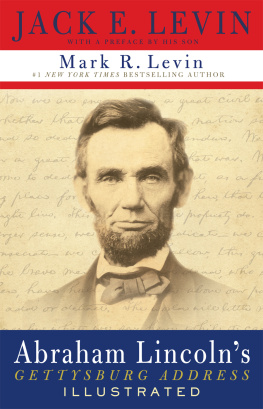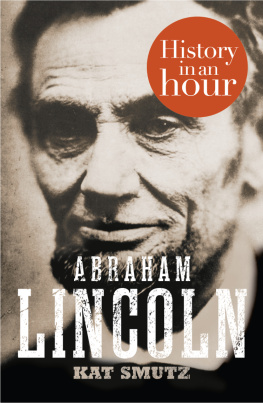
THE
GETTYSBURG
ADDRESS
and Other Writings

ABRAHAM LINCOLN

Compilation 2010 by Fall River Press
All rights reserved. No part of this publication may be reproduced, stored in a retrieval system, or transmitted, in any form or by any means, electronic, mechanical, photocopying, recording, or otherwise, without prior written permission from the publisher.
Cover design by Patrice Kaplan
Cover art Smithsonian Institution/Corbis (Lincolns hat); Manuscript Division/
Library of Congress (handwriting); Duncan Walker/iStockphoto (flag background)
Book design by Mary McAdam Keane
Fall River Press
122 Fifth Avenue
New York, NY 10011
ISBN: 978-1-4351-3698-4
CONTENTS


ABRAHAM LINCOLN IS A NEAR-LEGENDARY FIGURE IN AMERICAN history, and the dimensions of his legend assume many shapes based on the historical reality of his achievements. He was the quintessential self-made man who rose from humble origins to become the chief executive of his nation. He was a political idealist whose dedication to ensuring liberty and equality for all resulted in his assassination. And, as the documents collected in this volume attest, he was, although largely self-educated, the author of some of the most eloquent and insightful addresses, speeches, and correspondence in American letters of the nineteenth century.
Much of what we know about Lincolns early life comes from a short autobiographical essay that he wrote to be circulated during his campaign stump for the presidential election of 1860. He was born on February 12, 1809 in Hardin County, Kentucky (in a log cabin, as popular accounts emphasize). His family worshipped as Baptists, and it was partly their churchs opposition to slavery, which was allowed in Kentucky, that resulted in the Lincolns moving to Indiana when Abraham was nine. Abrahams formal education was limited to A.B.C. schools, which he attended for a total of less than two years. He spent most of his childhood clearing land and helping out on his fathers farm. In 1830, the family moved to Macon County, Illinois where Abraham split rails for fencing that staked out the boundaries of the Lincolns ten-acre farm. Three decades later, Rail-splitter Abe expressed amusement at how his humble roots became fodder for political propagandists: These are, or are supposed to be, the rails about which so much is being said just now, though these are far from being the first or only rails ever made by A[braham].
Striking out on his own that year, Lincoln eventually settled in New Salem, Illinois, where he joined a local volunteer militia to defend his town against forced reclamation as tribal property in the short-lived Black Hawk War. Although his unit never saw action, Lincoln was so well-liked locally that he was elected captain, in which capacity he served for three months. Convinced that he could translate his popularity into popular votes, Lincoln ran for the state Legislature in 1832 but was soundly trounced. Two years later, he ran for the Legislature on the Whig ticket and was elected. He would be re-elected another five successive two-year terms.
The enthusiasm and zeal with which the young legislator approached his new position can be gauged from one of Lincolns earliest recorded public speeches, Address Before the Young Mens Lyceum of Springfield, Illinois, delivered in January of 1838. We find ourselves in the peaceful possession, of the fairest portion of the earth, as regards extent of territory, fertility of soil, and salubrity of climate, he writes in exuberant praise of America. We find ourselves under the government of a system of political institutions, conducing more essentially to the ends of civil and religious liberty, than any which the history of former times tell us. Lincoln was a student of Henry Clay, one of the founders of Americas Whig Party, and the leading exponent of the American System, which was defined in part by ambitious efforts to develop and support the nations infrastructure through tariffs levied on foreign imports that encouraged citizens to buy American-made goods. Lincolns optimism about his country notwithstanding, the tariff system ultimately caused dissension between the northern and southern states, sowing seeds of discord that came to fruition during his presidency.
Lincolns Democratic opponent for his Legislature seat, John T. Stuart, was so impressed with how the young legislator handled his campaign that he encouraged Lincoln to study law. Lincoln obtained his law license in 1836 and moved to Springfield where, in 1837, he and Stuart became partners. Lincoln married Stuarts cousin, Mary Todd, in 1842. Their union produced four children, only one of whom lived to adulthood.
In 1846, Lincoln was elected to the United States House of Representatives where he served only one term before resuming his law practice. He returned to the political arena in 1854 when the Kansas-Nebraska Act was passed, repealing the limits imposed on slave ownership established by the Missouri Compromise in 1820. The Kansas-Nebraska act left the decision of whether or not to allow slavery up to the popular sovereignty of the people of any new American territory. The main architect of the popular sovereignty doctrine was Stephen Douglas, a Democratic representative from Illinois who vigorously supported the Dred Scott Decision of the United States Supreme Court and its ruling that Congress had no right to prohibit slavery in federal territories. In 1858 Lincoln, who had shifted his allegiance from the Whig Party to the newly created Republican party in 1856, challenged Douglas for his seat in the Senate. The two staged a series of debates between August 21 and October 15 of that year that have achieved legendary status in American political history, with Lincoln promoting the sovereignty of the republic and Douglas the democratic freedoms guaranteed to the people. Lincolns famous A House Divided Speech, in which he proclaims this government cannot endure, permanently half slave and half free, is the fullest articulation of his stand on the issues of slavery and the Union prior to the debates.
Although Lincoln lost the election, the debates thrust him into the national spotlight as a powerful orator and helped to clarify slavery as an issue whose many ramifications threatened to divide the nation. Lincoln and Douglas took their rivalry to the 1860 presidential election where Lincoln emerged victorious to become the nations sixteenth president. His resolve to keep the republic united was tested even before his inauguration. Less than two months after his election win, South Carolina seceded from the Union. By February 9, 1861, eleven of thirteen seceding states had declared themselves the Confederate States of America and chosen Jefferson Davis as their president. With the firing on Fort Sumter on April 12, 1861, little more than a month after Lincolns inauguration, the American Civil War began.
In a letter to Horace Greeley written in August of 1862, Lincoln eloquently declares the preservation of the Union as his top priority as president: My paramount object in this struggle
Next page
